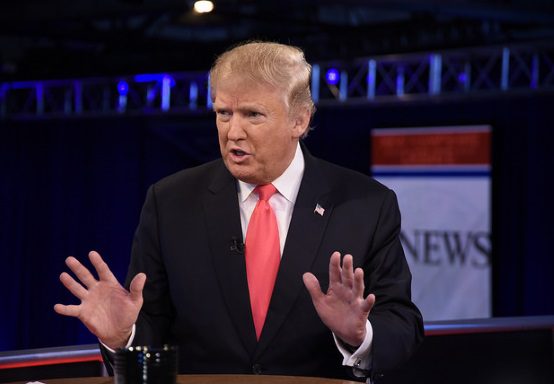Trump’s Foreign Policy Interview

The New York Times interviewed Donald Trump on foreign policy, and as usual he gave a number of provocative, ill-conceived, and confused answers. For instance, there was this exchange on NATO allies that has received the most attention and criticism:
SANGER: My point here is, Can the members of NATO, including the new members in the Baltics, count on the United States to come to their military aid if they were attacked by Russia? And count on us fulfilling our obligations.
TRUMP: Have they fulfilled their obligations to us? If they fulfill their obligations to us, the answer is yes [bold mine-DL].
It’s important to understand what Trump isn’t saying here. He isn’t against defending these states all together, and appears willing to go to war with Russia for them provided that they have “fulfilled their obligations.” Atlanticists aren’t happy with this because it creates the possibility that some NATO members might not be able to count on Washington’s support. To make things even less clear, Trump’s definition of “obligations” is typically and intentionally vague. It is tied to the member states’ level of military spending, but it may not be limited to that. He also says elsewhere in the interview that he doesn’t want to say what would happen if the allied states didn’t fulfill their obligations. He adds later:
I don’t want to tell you what I’d do because I don’t want Putin to know what I’d do.
This is in line with Trump’s fixation with being unpredictable, and he falls back on this whenever he can’t or won’t answer a question. The problem with all of this isn’t just that it creates uncertainty about whether the U.S. would defend treaty allies it is obliged to defend, but that Trump thinks that creating uncertainty about how the U.S. will act is always a virtue. This saves him from having to explain or justify any of his policies, and leaves voters and other governments in the dark about what they can reasonably expect. Whatever else one wants to say about Trump’s statements, they are unacceptably vague and ill-formed, and there has clearly not been much thought put into the implications of any of the positions that he is gesturing towards.
As ever, Trump’s preoccupation is with making a new deal and getting reimbursed:
If we cannot be properly reimbursed for the tremendous cost of our military protecting other countries, and in many cases the countries I’m talking about are extremely rich. Then if we cannot make a deal, which I believe we will be able to, and which I would prefer being able to, but if we cannot make a deal, I would like you to say, I would prefer being able to, some people, the one thing they took out of your last story, you know, some people, the fools and the haters, they said, “Oh, Trump doesn’t want to protect you.” I would prefer that we be able to continue [bold mine-DL], but if we are not going to be reasonably reimbursed for the tremendous cost of protecting these massive nations with tremendous wealth…
Trump explicitly says several times that he would prefer to maintain U.S. alliance commitments, but wants more reimbursement (whatever he thinks that means). That reflects his odd, deal-obsessed approach to foreign policy, and it tells us that he doesn’t understand how treaty alliances work, but it also doesn’t mark as large of a break with the status quo as his detractors fear and his supporters hope. That is, he doesn’t really object to U.S. entanglements in other parts of the world, but only to arrangements in which he thinks the U.S. is not being paid enough for its trouble. That’s a misguided, mercenary way to think about these issues, and it doesn’t inspire any confidence that Trump knows what he’s talking about.
That said, his remarks on NATO are useful in drawing attention to a few important truths. First, if our allies can always count on the U.S. to come to their aid and can also rely on the U.S. to bear most of the burden of their defense, they will never have any incentive to increase their own military spending and they never will increase it. They will cheap- or free-ride forever, and will remain dependent on the U.S. for as long as we let them. That is how our hawks like it, but that doesn’t mean it is a desirable arrangement. It isn’t good for the U.S. to be in the position of subsidizing the defense of wealthy allies indefinitely, and ultimately it puts European allies in the unenviable position of depending on the continued willingness of a distant great power to guarantee their security.
That brings us to the other important and unpleasant truth highlighted here: the U.S. and the rest of NATO should never have given security guarantees to the Baltic states. It strains credulity to say that the U.S. and its other NATO allies would actually go to war to defend them. Foolish proponents of NATO expansion undermined the credibility of the Article 5 guarantee by extending it to states without regard for whether they could or would be defended in the future, and now we are left with commitments that shouldn’t have been made and can be fulfilled only with great difficulty and potentially at enormous cost. That is the real problem that the U.S. will have in Europe long after the Trump campaign has ceased to matter.
Comments